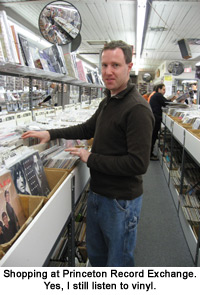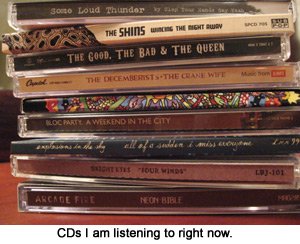 I am always looking for indications and metaphors for the changes we are experiencing within publishing. Among the questions I focus on:
I am always looking for indications and metaphors for the changes we are experiencing within publishing. Among the questions I focus on:
- Why are we moving from a print model to a digital model?
- What is the value of the information that publishing companies produce?
- What is the role of publishing within each industry?
- What can make people’s lives & businesses better?
- What is the adoption rate of these changes?
- What is Fabio doing at this very moment?
Over the next few weeks, I will look at two other media industries in order to identify how they are changing, why, and ideally, how it relates to B2B publishing. In three installments, I will look at:
- The music industry: Quantity. (this week)
- The music industry: Quality.
- Book publishing.
Music Hasn’t Changed, But Everything Around it Has
By the "quantity" of music, I mean, music discovery. How do you find new music? How do you consume this media?
This week, reports indicated that compact disc sales were down 20% from last year, a much steeper rate of decline than previously experienced, and an amount that was not made up for by legal digital downloads.
Now, I love music, and am passionate about discovering new bands and adding great music to my collection. I used to discover new music in the following ways:
- Recommendations from friends.
- Recommendations from the employees and shelves of my favorite record stores.
- Music magazines.
Thanks to the web, that has mostly changed now. Let me introduce you to my new best friend: The Hype Machine.
What Hype Machine does is brilliant. First, it aggregates and organizes content from people’s music blogs – sites which post blog entries and individual MP3s about music they like. Essentially, Hype Machine tells you what is buzzworthy.
But that’s not all. They have this little music player, that aggregates these songs, so you can listen to full songs of artists or music that you like.
I can’t tell you how compelling it is to see a ranking of the top bands that people are blogging about, read the blog entries, and then hear the music in its entirety. Not only that, but Hype Machine gives you links to purchase the music on Amazon or iTunes. Personally, I do take that critical next step and actually buy the albums I like.
 There many ways to get music online, and this list is just the tip of the iceberg:
There many ways to get music online, and this list is just the tip of the iceberg:
- Digital download services.
On services such as iTunes, you can purchase individual tracks, or entire albums. - Subscription services.
Services such as Rhapsody, you pay a fee, and have access to a huge catalog of music that you can listen to. - Illegal downloads.
You can grab MP3 files from blogs, torrent sites, and other less-than-legal communities and services. - Other Music Discovery Services.
Aside from The Hype Machine, services such as Pandora and Last.fm allow you to find new music based on songs or artists you already like. - Internet radio stations.
Whether it’s your favorite local station, one from across the country, or a web-only service, there is no shortage of streaming music to listen to. - Other web 2.0 music services.
The Music 2.0 Directory lists many other sites that are focused on music discover.
As Media Consumption Changes, The Role of Content Does As Well
 Now, how does this all relate to B2B publishing? Well, think about it this way: the traditional way of discovering music, purchasing it, and consuming it no longer applies. These functions have been spread out among the masses.
Now, how does this all relate to B2B publishing? Well, think about it this way: the traditional way of discovering music, purchasing it, and consuming it no longer applies. These functions have been spread out among the masses.
The role of the record store has shifted dramatically. I used to know the people who worked at my favorite record stores by name. They would know what music I liked and recommend new music for me to listen to. They charged whatever they wanted, and I paid it. If they didn’t’ have something in stock, I would special order it. It they didn’t know about it or have it, neither did I.
Scott Karp of Publishing 2.0 relates it this way: “Is Content Still a Business?” His argument, in short:
- The content business is not profitable and doesn’t scale anymore.
- Content is being looked at as a loss-leading marketing platform.
- Disaggregation is disrupting our ability to package content.
- The content distribution businesses (think Google, YouTube, MySpace, Facebook, Digg) are the only real media businesses left.
As we think about how the media consumption lifestyle of our audience is changing, I think it is valuable to look at other industries such as the music industry. Who would have thought that of the following scenarios 10 years ago:
- That record labels would keep control of their artists, yet lose their primary revenue source?
- That record stores would not only be usurped by the giant, faceless Wal-Mart, but by the fans and consumers themselves, creating their own social hubs online.
- Or that music consumption would seemingly rise dramatically via products like the iPod, yet the entire industry is in turmoil about how to properly monetize itself.
Will something similar happen to articles, industry data, and expert reports in B2B markets? At what level do media companies need to partner with their audience to ensure that they move online together, and find the proper business opportunities? As publishing moves towards the digital domain, what is the proper transition time?
There is no single answer to these questions, and certainly many other relevant questions to ask. However, a peek into the music industry gives some interesting insight. Who ever thought that listening to your favorite song could be so complicated?
